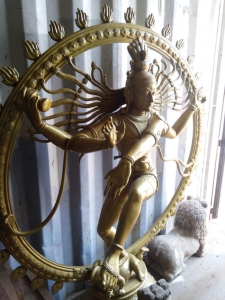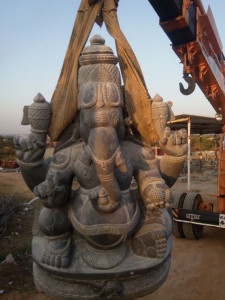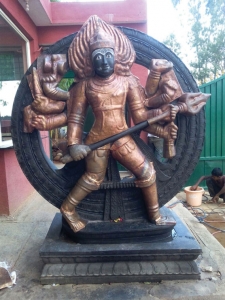Nithyananda Sacred Arts is established to preserve, revive and spread the Vedic temple arts, architecture and artefacts for people to live and experience the rich consciousness-based vedic heritage.
~ Paramahamsa Nithyananda
TO HAPPEN
Cost Estimate: INR 250 Crores
– Evolve as an independent city producing vedic temple arts and artefacts for distribution to the whole world. Produce items for 400 temples within the next 3 years.
– Confer doctorate degrees on the sthapathis and artisans for preserving the invaluable vedic knowledge and skill.
Nithyananda Sacred Arts
Awakening the World to the Splendor of Indian Temple Arts
| Material | Quantity | Weight |
| Metal | 562 statues | 17,325 kg |
| Stone (granite) | 2674 statues | 1.07 million kg |
| Marble | 482 statues | 96,400 kg |
| Wood | 261 statues, vehicles, thrones, etc. | |
| Jewelry & Decoration | For 1280 deities |
śilpaṁ hāsminnadhigamyat ya evaṁ veda | yadeva śilpānī |
ātmasanskṛtirvāva śilpāni cchandomayaṁ vā etairyajamāna ātmānaṁ sanskurute ||
Shilpāni, works of art of man, is the imitation of divine forms. By employing their rhythms, the artisans metrically reconstitute, and interpret the limitless knowledge of the sacred hymns, from the limits of human ability.
~ aitareya brahmana, rig veda, 6.5.27
Accomplishments
- Continuously producing temple structures, deities, vahanas (vehicles of the deities), flagstaffs, temple jewelry, worship items, kavacham (sacred armors), sacred weapons, deity arches, crowns & jewelry of deities, chariots & thrones as per the Agama Shastra – the oldest available scriptural text of instructions from Lord Shiva.
- These sacred creations are sent to all the Nithyananda Hindu Temples and home temples in 33 countries, including Singapore, Malaysia, USA, Canada, Australia and many states of India
- Casting of metal deities in Panchaloha (5-metal combination of copper, brass, zinc, tin and gold), involving an elaborate and authentic process of a single mould for every metal casting, employing the following processes:
- Wax modelling of deities
- Covering the wax model with mud from the banks of the river Cauvery
- Melting the wax through extremely high temperatures
- Pouring molten metal into the mud mould to cast the deities
- Extracting the metal deity from the mould and finishing it through skilled sculpting work
- Temple arts in not only panchaloha, but also in silver, stone, sheet metal, marble and wood.
- Generating intricate line drawings and crafting the rare sculpting tools that are unavailable in the regular market.
- Employing the ‘Sithuzhivelai’ – extremely fine and nested carving on metal using extra-fine tools to show ornate details on the deity forms.
- Using only the coconut palm leaf for all measurements with the vedic unit of measurement called ‘talam’.
- Training, livelihood and growth opportunities to sthapathis – temple architects – and hundreds of artisans and their families, giving them economic stability to continue their family profession over generations.
- 1 lakh vedic artefacts collected from all over India, rejuvenated and distributed for everyday usage to infuse deeper consciousness and better health into modern day living.




